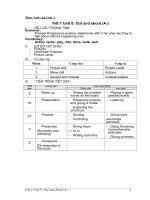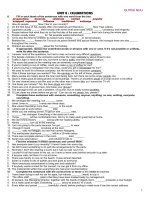UNIT 8 - 1
Bạn đang xem bản rút gọn của tài liệu. Xem và tải ngay bản đầy đủ của tài liệu tại đây (86.46 KB, 5 trang )
UNIT 8 : THE STORY OF MY VILLAGE
I. Circle the sound for the letter(s) in bold.
1. road / a / / / 11. goes / a / / /
2. town / a / / / 12. follow / a / / /
3. throw / a / / / 13. couch / a / / /
4. around / a / / / 14. towel / a / / /
5. house / a / / / 15. phone / a / / /
6. though / a / / / 16. out / a / / /
7. over / a / / / 17. told / a / / /
8. mountain / a / / / 18. shoulder / a / / /
9. narrow / a / / / 19. boat / a / / /
10. drought / a / / / 20. crowd / a / / /
II. Complete the passage with the suitable words from the box.
preserved housed labourers outbuildings village life community fields
In most of Europe, farmers’ homes and (1) ________ are generally located within a village, and tools
and animals are (2) ________ there. Every morning, the farmers and farm (3) _______ leave their (4)
________ to work their land or tend their animals in distant (5) ______ and return to the village at the
end of the day. Social (6) _______ is thus centripetal; that is, it is focused around the (7) _______
center, the village. Only in certain parts of Quebec has this pattern been (8) ________ in North America.
III. Turn each direct speech statement into indirect speech with tense changes.
1. ‘I knew nothing about the problem.’
She protested______________________________________________________________
2. ‘Oh, I’m too hot.’
He moaned________________________________________________________________
3. ‘I’ve never worked so hard before.’
Our decorator remarked______________________________________________________
4. ‘I like your coat, I’m looking for one like that myself.’
She told me________________________________________________________________
5. ‘Careful ! You’ll fall through the ice.’
I warned him_______________________________________________________________
6. ‘You must be home by 9 o’clock.’
She said___________________________________________________________________
7. ‘John left here an hour ago.’
She told me________________________________________________________________
8. ‘I easily beat everyone else in the race.’
He boasted________________________________________________________________
9. ‘I’ve been spending a lot more time with my children.’
He mentioned______________________________________________________________
10. ‘Jim’s arriving at our house tomorrow.’
She told me________________________________________________________________
11. ‘You can stay in my house when I am on holiday.’
Jim told us_________________________________________________________________
12. ‘I’m sorry I couldn’t come to visit you last summer.’
Mary said__________________________________________________________________
13. ‘I was sure I’d left it here.’
He said____________________________________________________________________
14. ‘I grew these carrots myself.’
He told me_________________________________________________________________
15. ‘I must say that at first I was confused by the question.’
She confessed______________________________________________________________
IV. Report these questions using a wh-, if or whether-clause, as appropriate.
1. ‘Are you enjoying yourself ?’
He wanted to know__________________________________________________________
2. ‘What’s the weather like ?’
She asked me______________________________________________________________
3. ‘Does Ann always go to church on Sundays ?’
He wondered_______________________________________________________________
4. ‘What does Frank do for a living ?’
I wanted to know____________________________________________________________
5. ‘Have you seen John recently ?’
She asked me______________________________________________________________
6. ‘Has Debbie been working here long ?’
He wanted to know__________________________________________________________
7. ‘Why is Maria crying ?’
She wondered______________________________________________________________
8. ‘What kind of holiday has Marco had ?’
We wanted to know__________________________________________________________
9. ‘Did you study hard for the exam ?’
She wondered______________________________________________________________
10. ‘How long have you both been living here ?’
They inquired_______________________________________________________________
11. ‘Will Ted and Alice be at the party ?’
She asked us_______________________________________________________________
12. ‘What did you think of the performance yesterday ?’
She asked me______________________________________________________________
13. ‘Who were you looking for ?’
He asked me_______________________________________________________________
14. ‘Are meals included in the price, or not ?’
He asked me_______________________________________________________________
15. ‘How can I solve the problem ?’
I wanted to know____________________________________________________________
V. Complete the sentence to report what was said, using the verb in brackets and a to-infinitive
clause. If necessary, add an appropriate object after the verb.
1. ‘Would you like to come on a picnic with us ?’ (invite)
He_______________________________________________________________________
2. ‘Please don’t tell anybody what happened.’ (ask)
He_______________________________________________________________________
3. ‘If you don’t give me a pay rise. I’ll resign.’ (threaten)
He_______________________________________________________________________
4. ‘Can I borrow your pencil ?’ (ask)
He_______________________________________________________________________
5. ‘I’ll finish the work by the end of this week.’ (promise)
He_______________________________________________________________________
6. ‘You ought to take a break, Andrew.” (advise)
He_______________________________________________________________________
7. ‘Don’t forget to go to the supermarket after work.” (remind)
He_______________________________________________________________________
8. ‘Stay away from me.” (warn)
He_______________________________________________________________________
9. ‘If you can’t find anyone else, I’ll drive you to the airport.’ (volunteer)
He_______________________________________________________________________
10. ‘Why don’t we sing a few songs ?’ (suggest)
He_______________________________________________________________________
VI. Choose the correct answer to complete each sentence.
1. She reassured me that she ________ the card.
a. had posted b. has posted c. was posting d. posts
2. When I was little, my father gave me some advice. He said ______ to the strangers.
a. I shouldn’t talk b. that shouldn’t talk c. don’t talk d. that I don’t talk
3. ‘Should we turn left or go straight ?’. ’Hmm, I’m not sure which way _______.
a. do we turn b. to turn c. should we turn d. it turned
4. She _______ her holiday in Finland.
a. said me about b. told about c. said about d. told me about
5. I don’t know why Susan didn’t go to the meeting. She said _________.
a. she will definitely go b. she was definitely going
c. she had definitely go d. she is definitely going
6. The librarian asked us _______ so much noise.
a. don’t make b. not make c. not making d. not to make
7. Somebody forgot this hat. I wonder __________.
a. whose is this hat b. whose hat this is
c. whose hat is d. is this whose hat
8. ‘I’m taking my driving test tomorrow.’
When I saw Rachel, she said _________.
a. she was taking her driving test the next day.
b. she is taking her driving test the following day.
c. I was taking my driving test tomorrow.
d. she was taking the driving test tomorrow.
9. ‘Whose composition haven’t we heard yet ?’
The teacher asked us to tell her __________.
a. Whose composition we haven’t heard yet.
b. Whose composition we hadn’t heard yet.
c. Whose composition hadn’t we heard yet.
d. Whose composition we hadn’t heard yet ?
10. ‘Why don’t you join us for coffee, Don ?’
After the movie, we asked Don __________.
a. would he join us for coffee b. why he didn’t join us for coffee
c. to join us for coffee d. join us for coffee
11. ‘You look beautiful in that dress.’
Last night she told me __________.
a. you look beautiful in that dress b. you looked beautiful in that dress
c. I’ll look beautiful in this dress c. I looked beautiful in that dress
12. ‘What did your grammar teacher want to talk to you about ?’
‘I did badly on the last test. She ________ studied for it.’
a. said why hadn’t I b. said why I hadn’t
c. asked why hadn’t I d. asked why I hadn’t
13. ‘Hi Bob. Did you take the job ?’
Bob’s friend asked him ___________.
a. did he take the job b. whether you took the job
c. if he had taken the job d. had he taken the job
14. ‘Today is the happiest day of my life.’
At the reception last night, the groom said _________.
a. today was the happiest day of his life
b. that day was the happiest day of his life
c. yesterday was the happiest day of his life
d. today is the happiest day of his life
15. ‘Weather patterns change.’ Experts now say that __________.
a. weather patterns changed b. weather patterns are changing
c. weather patterns had changed c. weather patterns change
VII. Put a circle round the letter of the correct word or words to use in each blank.
According to the recent survey, most Chinese in Hong Kong preferred to work for Americans. They
said that during the past ten years or so American businesses (1) ______ well and were very friendly.
Almost all of them who had worked for Americans said they (2) _______ happy in their work.
They were then asked (3) ________ they liked working for American bosses. Most replied (4)
_______ they were usually fair, kind, friendly and generous.
When asked whether (5) ______ working for British bosses, however, the Chinese (6) _____ that the
British bosses were too strict and proud.
The survey (7) ______ among 200 Chinese managers and advanced business students in Hong
Kong. Most of the people (8) _______ said that the working conditions were also much better in
American companies.
When managers were asked (9) _______ they often conducted business, they replied that they (10)
_______ to tea houses. A few people said that (11) ________ business with Americans over lunch at
expensive hotel restaurants.
1. a. pay b. will pay c. are paying d. paid
2. a. are b. will be c. have been d. were
3. a. that b. if c. about d. why
4. a. to b. that c. if d. about
5. a. did they like b. they liked c. they did like d. liked they
6. a. answer b. will answer c. answered d. have answered
7. a. conducted b. was conducted c. has conducted d. was conducting
8. a. interview b. to interview c. interviewed d. interviewing
9. a. where b. when c. how d. if
10. a. are going b. have gone c. went d. will go
11. a. they had often done b. they often had done
c. had they often done d. often had they done
VIII. Choose the correct form of the verbs to complete these sentences.
1. If I _____ the bus this afternoon, I’ll get a taxi instead.
a. miss b. will miss c. missed d. had missed
2. We’ll have to go without John if he _____ soon.
a. won’t arrive b. will arrive c. arrives d. doesn’t arrive
3. They _____ your money if you haven’t kept your receipt.
a. won’t refund b. didn’t refund c. no refund d. not refund
4. If I make some coffee, _____ the cake ?
a. do you cut b. will you cut c. are you cutting d. don’t you cut
5. If you _____ your homework, I _____ you watch TV.
a. won’t do/ let b. did/ won’t let
c. don’t do/ won’t let d. won’t do/ don’t let
6. If you want to see clearly, you _____ your glass.
a. wear b. will wear c. would wear d. must wear
7. If you’re scared of spiders, _____ into the garden.
a. won’t go b. you won’t go c. don’t go d. not go
8. If I _____ time tonight, I _____ the novel I’m reading.
a. will have/ finish b. have/ will finish
c. have had/ will finish d. have/ have finished
9. If it _____ next week, we _____ plant the vegetables.
a. rains/ won’t be able to b. will rain/ aren’t going to
c. rains/ aren’t going to d. will rain/ don’t plan
10. Get me a glass of lemonade if you _____ to the kitchen.
a. go b. will go c. have gone d. went
11. _____ your computer if I’m careful ?
a. Will I use b. Do I use c. Use I d. Can I use
12. I _____ angry if it _____ that you are wrong.
a. will/ turns out b. am/ will turn out
c. won’t be/ turned out d. will be/ turns out
13. If you _____ this switch, the computer _____ on.
a. press/ comes b. will press/ comes
c. press/ can come d. have pressed/ will come
14. If you _____ with the computer, I’ll put it away.
a. will finish b. have finished c. had finished d. finished
15. If Matthew is going to a job interview, he _____ a tie.
a. will wear b. can wear c. should wear d. might wear
IX. Look at the information in brackets and complete the sentences using if or when and a verb in
the present simple.
1. (I may see Tom tonight.) If I see Tom, I’ll tell him the news.
2. (Melanie is coming soon.) _____ can you let her in, please ?
3. (The alarm will ring soon.) _____ we all have to leave the building.
4. (I might feel better tomorrow.) _____ I’ll probably go back to work.
5. (This film finishes at ten.) _____ I’ll stop the video.
6. (The plan may not work.) _____ we’ll have to think of something else.
7. (I’m going shopping this evening.) _____ I’ll buy some food.
8. (You might hear some news.) _____ can you ring me immediately ?
9. (I’ll get home tonight.) _____ I’ll make myself an omelette.
10. (It might stay fine.) _____ I’ll probably go for a walk later on.
X. Choose the right alternative.
1. If anyone phones/ will phone, tell them I’ll be/ am back at 11:00.
2. I’ll phone you when/ if I get home from work.
3. We can hire a minibus if there’ll be/ there are enough people.
4. Brian looks very different now. When/ If you see him again, you don’t/ won’t recognize him.
5. If they will get/ get married, they will probably move/ probably move to France.
6. If you’ll leave/ leave now, you’ll be/ are home in two hours.
7. There won’t be/ aren’t enough chairs if everybody will come/ come.
8. Don’t worry if/ when I’m late tonight.
9. You have to/ will have to take a taxi home if you want/ will want to leave now.
10. If/ when they don’t come soon, I’m not going to wait.
XI. Choose the one option - a, b, c or d - that best completes the passage.
The country and the city have advantages and disadvantages. People in the country live in more
beautiful (1) _____. They enjoy peace and quiet, and can do their work at their own (2) _____ because
no one is in a hurry. They live in larger, more comfortable houses, and their (3) _____ are more friendly,
and ready to help them when they need it. However, their life can be (4) _____ and they can be (5)
_____, a long way from the nearest town, (6) _____ is a serious problem if they are ill or have to (7)
_____ children to school.
The city has all the (8) _____ the country lacks, but it also has a lot of disadvantages. Cities are often
ugly and (9) _____; they not only have bad air but are also noisy. Everyone is always in (10) _____ and
this means that people have no time to know each other and make friends.
1. a. scenery b. surrounding c. sightseeing d. view
2. a. step b. way c. pace d. ability
3. a. neighbors b. families c. children d. villagers
4. a. exciting b. interesting c. monotonous d. tiresome
5. a. isolated b. divided c. shut off d. kept away
6. a. this b. that c. what d. which
7. a. get b. take c. collect d. let
8. a. aids b. benefits c. services d. provision
9. a. polluted b. pollution c. polluting d. pollutant
10. a. quickly b. rush c. leisure d. haste









